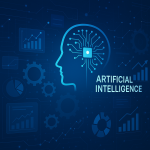In recent years, Artificial Intelligence (AI) has emerged as a transformative force in the marketing landscape. From personalized customer experiences to predictive analytics, AI is reshaping how businesses connect with their audiences. This article explores the multifaceted impact of AI on marketing strategies and the opportunities it presents for businesses in the digital age.
Personalization at Scale
One of the most significant contributions of AI to marketing is the ability to deliver personalized experiences at scale. Traditional marketing methods often relied on broad segmentation, but AI enables hyper-personalization by analyzing vast amounts of data to understand individual customer preferences and behaviors. This allows businesses to tailor content, product recommendations, and communication channels to each customer, enhancing engagement and conversion rates.
Predictive Analytics and Customer Insights
AI-powered predictive analytics tools can forecast customer behavior by analyzing historical data and identifying patterns. This capability allows marketers to anticipate customer needs, optimize campaign timing, and allocate resources more effectively. For instance, AI can predict which leads are most likely to convert, enabling sales teams to focus their efforts strategically.
Chatbots and Customer Service Automation
AI-driven chatbots have revolutionized customer service by providing instant, 24/7 support. These virtual assistants can handle a wide range of inquiries, from answering frequently asked questions to assisting with purchases. By automating routine interactions, businesses can improve response times, reduce operational costs, and free up human agents to handle more complex issues.
Content Creation and Curation
AI is also making strides in content creation and curation. Natural Language Processing (NLP) algorithms can generate written content, such as product descriptions and social media posts, while machine learning models can curate content by analyzing user preferences and engagement metrics. This not only streamlines content production but also ensures that the material resonates with the target audience.
Programmatic Advertising
Programmatic advertising leverages AI to automate the buying and placement of ads in real-time. By analyzing user data and behavior, AI can determine the most effective channels, timing, and messaging for ad placements. This results in more efficient ad spend, higher ROI, and improved targeting accuracy.
Ethical Considerations and Data Privacy
While AI offers numerous benefits, it also raises ethical considerations, particularly regarding data privacy. Marketers must navigate regulations such as the General Data Protection Regulation (GDPR) and ensure transparent data collection and usage practices. Building trust with consumers through ethical AI implementation is crucial for long-term success.
Conclusion
The integration of AI into marketing strategies is no longer a futuristic concept but a present-day reality. Businesses that embrace AI technologies can gain a competitive edge by delivering personalized experiences, optimizing operations, and making data-driven decisions. However, it's essential to balance innovation with ethical considerations to build lasting relationships with customers. As AI continues to evolve, its role in marketing will undoubtedly expand, offering new avenues for creativity and efficiency.
Personalization at Scale
One of the most significant contributions of AI to marketing is the ability to deliver personalized experiences at scale. Traditional marketing methods often relied on broad segmentation, but AI enables hyper-personalization by analyzing vast amounts of data to understand individual customer preferences and behaviors. This allows businesses to tailor content, product recommendations, and communication channels to each customer, enhancing engagement and conversion rates.
Predictive Analytics and Customer Insights
AI-powered predictive analytics tools can forecast customer behavior by analyzing historical data and identifying patterns. This capability allows marketers to anticipate customer needs, optimize campaign timing, and allocate resources more effectively. For instance, AI can predict which leads are most likely to convert, enabling sales teams to focus their efforts strategically.
Chatbots and Customer Service Automation
AI-driven chatbots have revolutionized customer service by providing instant, 24/7 support. These virtual assistants can handle a wide range of inquiries, from answering frequently asked questions to assisting with purchases. By automating routine interactions, businesses can improve response times, reduce operational costs, and free up human agents to handle more complex issues.
Content Creation and Curation
AI is also making strides in content creation and curation. Natural Language Processing (NLP) algorithms can generate written content, such as product descriptions and social media posts, while machine learning models can curate content by analyzing user preferences and engagement metrics. This not only streamlines content production but also ensures that the material resonates with the target audience.
Programmatic Advertising
Programmatic advertising leverages AI to automate the buying and placement of ads in real-time. By analyzing user data and behavior, AI can determine the most effective channels, timing, and messaging for ad placements. This results in more efficient ad spend, higher ROI, and improved targeting accuracy.
Ethical Considerations and Data Privacy
While AI offers numerous benefits, it also raises ethical considerations, particularly regarding data privacy. Marketers must navigate regulations such as the General Data Protection Regulation (GDPR) and ensure transparent data collection and usage practices. Building trust with consumers through ethical AI implementation is crucial for long-term success.
Conclusion
The integration of AI into marketing strategies is no longer a futuristic concept but a present-day reality. Businesses that embrace AI technologies can gain a competitive edge by delivering personalized experiences, optimizing operations, and making data-driven decisions. However, it's essential to balance innovation with ethical considerations to build lasting relationships with customers. As AI continues to evolve, its role in marketing will undoubtedly expand, offering new avenues for creativity and efficiency.


